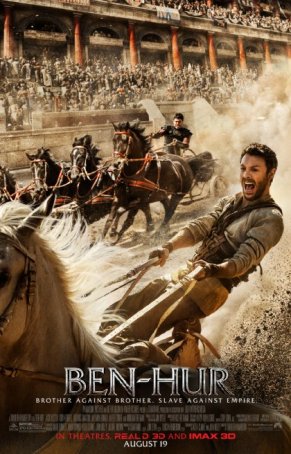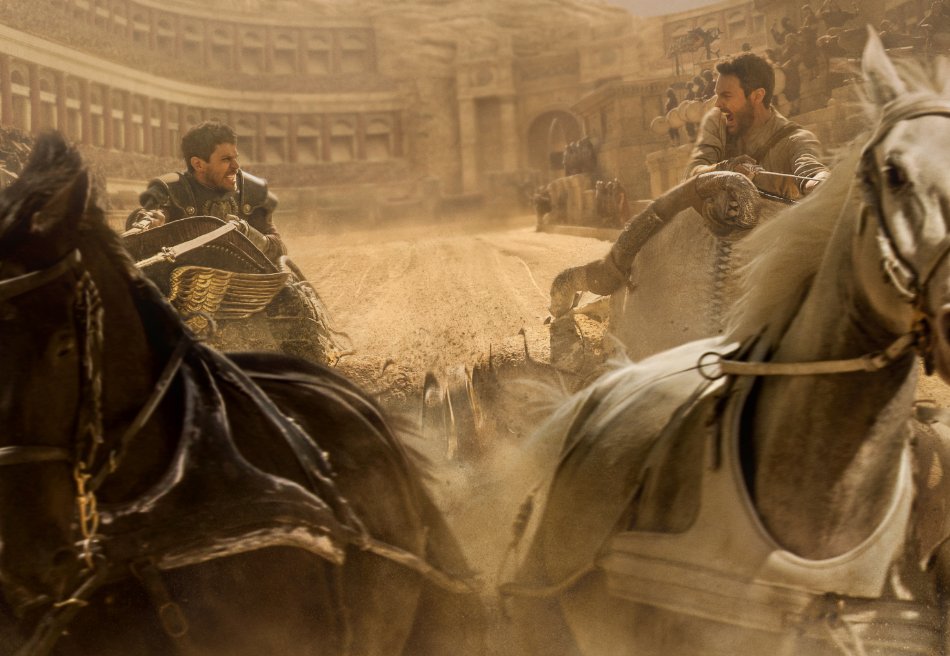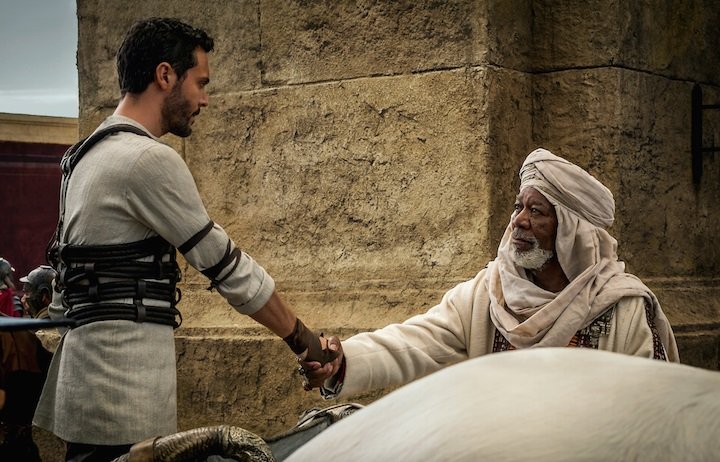Ben-Hur | Reelviews Movie Reviews (original) (raw)
Ben-Hur (United States, 2016)
August 21, 2016

If one thing is certain, it’s that director Timur Bekmambetov’s remake of Lew Wallace’s Ben-Hur isn’t going to make anyone forget the 1959 Charlton Heston classic. An amateurish effort that boasts direct-to-video characteristics, the latest version disappoints in almost every production aspect. The acting, primarily by Jack Huston (as Judah Ben-Hur) and Toby Kebbell (as Messala Severus), is wooden. The screenplay features dialogue that sounds like it was scripted for inclusion in a parody. And Bekmambetov’s direction proves incapable of pulling us into the story.
Length is part of the problem. Ben-Hur should be a sprawling epic of two adopted brothers divided by culture and politics and transpiring in the shadow of Jesus’ life and death. However, in order to cram as much of the book as possible into about two hours (by contrast, the 1959 version runs more than 3 1/2 hours), the filmmakers resort to a rambling monologue (read by Morgan Freeman, who also has a supporting role) and a hack-and-slash campaign in the editing room. Parts of the movie descend into incoherence and there are jarring transitions that will leave viewers in a state of head-scratching confusion. Where did that character go? How did we get here?
 Ben-Hur tells the saga of Jewish prince Judah Ben-Hur and his adopted brother, Roman orphan Messala Severus. As boys, the two are close, and Messala falls in love with Judah’s blood-sister, Tirzah (Sofia Black-D’Elia). Eventually, however, Messala decides to leave Jerusalem to make his own mark in the world. During his absence, unrest grows and Judah finds himself in an uneasy position caught between Israeli “zealots” and the city’s Roman overlords. When Messala returns at the head of a Roman garrison, friction erupts between the brothers; this turns to outright hostility when a zealot under Judah’s protection attempts to assassinate the Roman governor, Pontius Pilate (Pilou Asbaek). Judah, bearing responsibility for the attack, is sold into slavery to toil as a rower in the bowels of a Roman ship, where he spends the next five years nursing a grudge and wondering what became of his sister, mother (Ayelet Zurer), and gentle wife, Esther (Nazanin Boniadi).
Ben-Hur tells the saga of Jewish prince Judah Ben-Hur and his adopted brother, Roman orphan Messala Severus. As boys, the two are close, and Messala falls in love with Judah’s blood-sister, Tirzah (Sofia Black-D’Elia). Eventually, however, Messala decides to leave Jerusalem to make his own mark in the world. During his absence, unrest grows and Judah finds himself in an uneasy position caught between Israeli “zealots” and the city’s Roman overlords. When Messala returns at the head of a Roman garrison, friction erupts between the brothers; this turns to outright hostility when a zealot under Judah’s protection attempts to assassinate the Roman governor, Pontius Pilate (Pilou Asbaek). Judah, bearing responsibility for the attack, is sold into slavery to toil as a rower in the bowels of a Roman ship, where he spends the next five years nursing a grudge and wondering what became of his sister, mother (Ayelet Zurer), and gentle wife, Esther (Nazanin Boniadi).
Dramatically, Ben-Hur never finds its footing. Although the rivalry between Judah and Messala is capably conveyed, it occurs in a vacuum because the early scenes fail to establish a credible bond of brotherhood between the characters. Likewise, Judah’s romance with Esther and Messala’s longing for Tirzah are presented in a perfunctory fashion. The film gives us statues, not characters. The set design is impressive but, for those unfortunate enough to pay the $3 surcharge to see this in 3-D, it’s largely ruined by one of the worst conversions we’ve seen in years.
 Then there’s the Chariot Race. Even those who haven’t seen any of the previous iterations of Ben-Hur know this is the movie’s signature scene. In the 1959 film, it’s a tense, no-holds-barred action sequence. Bekmambetov’s attempts to emulate the excitement and suspense while putting his own stamp on the scene result in a disappointingly uninspired climax. By focusing on failed spectacle and attenuating the associated emotional weight of the confrontation, the filmmakers ensure that 2016’s Ben-Hur offers little that’s memorable.
Then there’s the Chariot Race. Even those who haven’t seen any of the previous iterations of Ben-Hur know this is the movie’s signature scene. In the 1959 film, it’s a tense, no-holds-barred action sequence. Bekmambetov’s attempts to emulate the excitement and suspense while putting his own stamp on the scene result in a disappointingly uninspired climax. By focusing on failed spectacle and attenuating the associated emotional weight of the confrontation, the filmmakers ensure that 2016’s Ben-Hur offers little that’s memorable.
Jesus’ role is that of a spectral figure who occasionally pops up to spout Biblical passages and enact moments excised from the gospels. Played by an uncharismatic and unconvincing Rodrigo Santoro, the character and his story, despite being central to the source material, feel shoehorned into this movie. His importance at the end unbalances an already confused narrative and the influence of his philosophy on the characters results in a cavalcade of hard-to-swallow kumbaya moments.
The motivation for remaking Ben-Hur appears to have been financial, an attempt to develop an epic motion picture with strong appeal to Christian movie-goers. (We saw how well that strategy worked with Ridley Scott’s Exodus.) But having a worthy story is a far different thing than telling it in a compelling, involving fashion. Bekmambetov has argued that the 1959 version is outdated but, comparing this new version to that one, it’s hard to believe anyone would choose Jack Huston’s forgettable interpretation to Heston’s iconic one. Skip the new theatrical adaptation and rent the classic instead. It’s a bigger picture even when seen on a smaller screen.